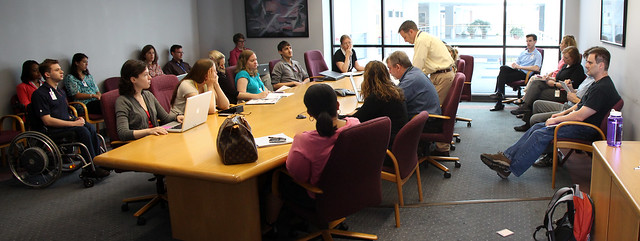This post presents 3 images that you might find helpful as you work at determining priorities for your work, family, health and otherwise.
Urgent/Important Matrix
Impact/Effort Matrix
Importance/Feasibility Matrix
This post presents 3 images that you might find helpful as you work at determining priorities for your work, family, health and otherwise.
This blog post was inspired by a session on assessing team processes that I attended at the Festival of Learning.
The session presenters were from Royal Roads University (RRU) where teamwork is the pillar of most programs. Because teamwork is such an integral part of their course and program design, and because teamwork also presents many challenges, the Coaching & Counselling Centre (CCC) and Centre for Teaching and Education Technology (CTET) have partnered to develop resources and workshops to help students and faculty members improve team-based learning1 at RRU.
Below are some notes and learnings from the session on assessing team processes:
Other resources this session inspired me to look into:
If you have resources to share, please leave them in the comments or be in touch with me via Twitter or email.
At the Festival of Learning, I attended Dr. Greg Chan’s sessions:
This was a terrific opportunity to spend a day exploring web visibility in my professional life and planning for changes in my online portfolio. Below are a list of links and random ideas related to the workshop and my learning.
To check what shows up when I Google myself, open up an incognito window in Chrome and search my name. Any surprises? I was happy to see that what appeared was: my isabeauiqbal.ca site, my CTLT affiliation (I expected this to be lower down), my LinkedIn, Twitter, and then some pictures (mostly me).
#WednesdayWisdom
#Scholar Sunday
#AcaDowntime
ICYMI – (in case you missed it)
FTW (for the win) – sometimes about yourself, but can be of someone else to celebrate their accomplishment
HT (hat tip) – give an accolade to
PRT – please retweet (If you want to make RT stronger, tag people)
TT – throwback Thursday
YOLO – you only live once (i.e. photo of you Skydiving or less dramatic)
For additional perspectives on Greg’s sessions, you can also see:
@fol_media #socialmediaBCTLC #FoL16
As a result of attending Greg’s workshops, here is what I have committed to:
A facilitator is one who contributes structure and process to interactions so groups are able to function effectively and make high-quality decisions.* (Bens, 2012)

I recently attended a full day session on building facilitation skills for meetings. Despite the large amount of time I spend in meetings—as a participant and as a facilitator-participant—I have never formally learned about meeting design. The facilitator, Charles Holmes ran a great session and I learned a lot. In this blog post, I write about one key idea from the session: Desired meeting results (the ‘learning outcomes’ equivalent of meetings).
Desired meeting results (DMRs) are concise written statements sent to meeting participants ahead of time, which help participants picture what they must accomplish by the end of the meeting.
DMRs help participants gain clarity on the following:
DMRs are different from the purpose, which describes the overall “why?” of having the meeting. And, they are different from the agenda, which describes the how of getting to the DMRs (the agenda is where you find the verbs).
Below is the framework that was suggested at the workshop. As mentioned above, this information would be sent to participants ahead of time:
Here is my stab at applying the framework to a meeting I am having on Tuesday.
At the end of the meeting, it is important to revisit the DMRs. And, though this isn’t uniquely related to the DMRs, it is also useful to spend some time debriefing “What worked?” and “What would you do differently next time?”
For additional resources on meeting design, see:
Into the Heart of Meetings: Basic Principles of Meeting Design (Book, 2013)
Let’s Stop Meeting Like This: Tools to Save Time and Get More Done (Book, 2014)
And, of course, work by Ingrid Bens (quoted at top of page)
*Bens, I. (2012). Facilitating with ease: Core skills for facilitators, team leaders and members, managers, consultants, and trainers. San Francisco, CA: John Wiley & Sons.
|
Desired Meeting Results Framework Why are we having this meeting (the purpose) |
Here is my stab at applying the above framework to a meeting I am having on Tuesday.
Why: To advance the work of the BMLSc program review and renewal initiative
DMR:
By the end of this meeting, we will have
1. Program-level learning outcomes that we are ready to send out to graduates, course leads, and section leads for their feedback
2.
a) Feedback to CH on the draft surveys so that she can prepare a revised version
b) A date selected by when the revised surveys will be ready
3.
a) Decision about who will craft a draft of the text that will accompany the surveys
b) A date selected by when the draft text will be ready
4. A meeting date to discuss a plan for the next 6-12 months (we may or may not get to this)
Agenda:
1. As a group, review the PLOs on the Google doc and make further edits.
2. Amanda and Isabeau to provide feedback to CH on the 2 draft surveys. If helpful, we can all spend time revising the surveys using the survey tool. Decide by when CH can have next version to share.
3. Discuss who should craft the email that will accompany the surveys and make a decision. Agree on when that survey will be sent out.
4. Determine a meeting time during which we (who?) will create a long-term (6-12 months) plan that can be presented to Andrea H before the end of July.